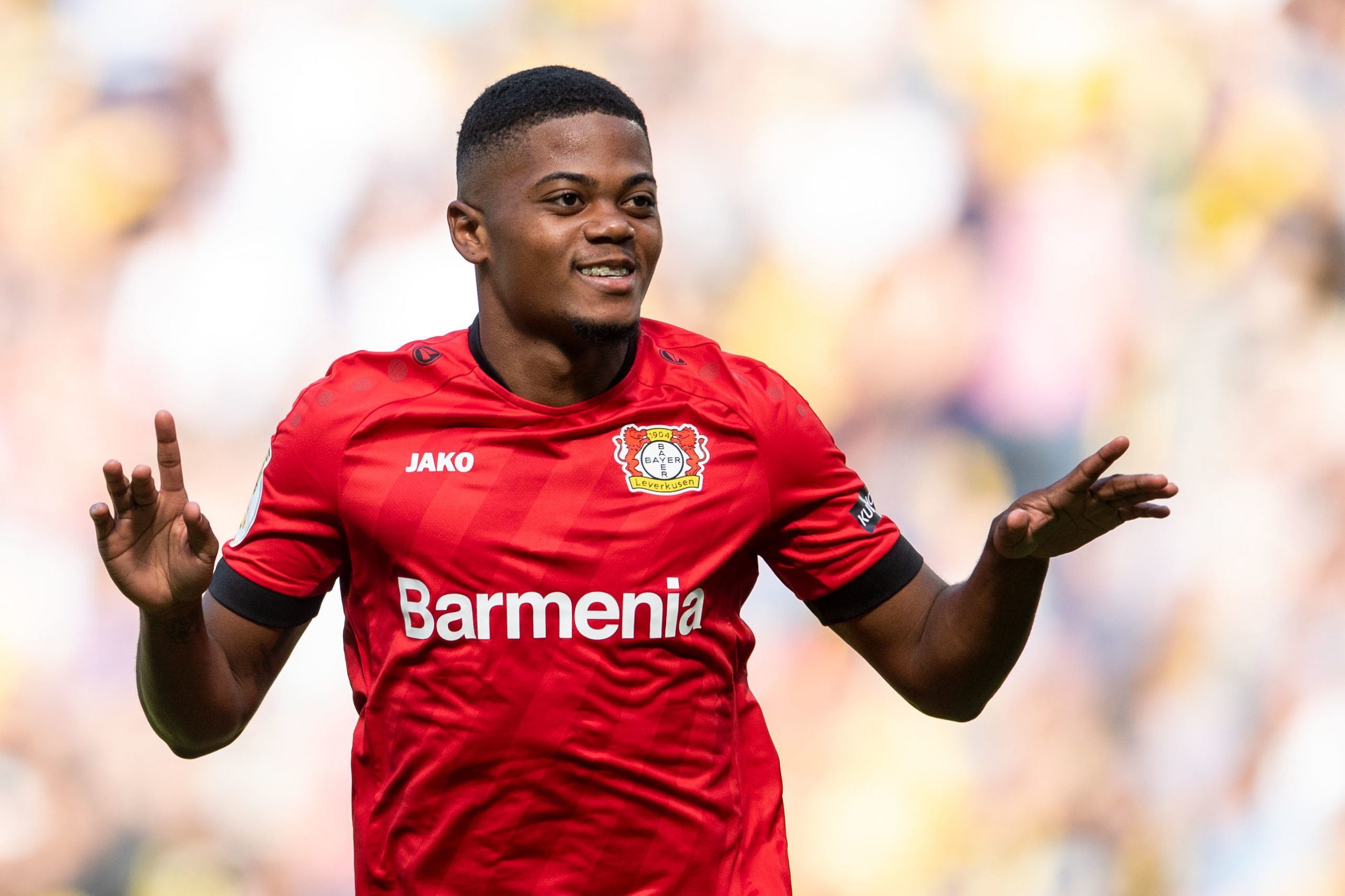The most appropriate way of analyzing the 2018–19 season for Bayer Leverkusen is to break it into two halves: what occurred before and after the hiring of Peter Bosz.
The first half of the season under Heiko Herrlich was nothing more than a disappointment, placing ninth with agoal differential of -3. Given the high end attacking talent that existed on the squad with the likes of Leon Bailey, Kai Havertz, and Kevin Volland, only ranking middle of the pack in goals scored was not what many had expected, especially since the 2017-18 season was a rather positive one.
What came after, with Peter Bosz’s appointment, was dramatically different with both results and overall playing style moving in a more positive direction. Leverkusen went from a mediocre side to one that arguably played like the 2nd best team in the Bundesliga, an amazing jump in performance given the mid-season managerial change. For Bosz, the success he had last season helped wash away the bitter taste from his failed stint as Dortmund manager in 2017–18. The most important accomplishment for Leverkusen was that all the success they had in 2019 helped them sneak into the top 4 by season’s end and qualify for the Champions League, something that’s crucial to the club on a number of fronts.
With the majority of their squad returning, along with some interesting additions via the transfer market, Bayer Leverkusen look to once again possess a squad that should be one of the better sides in the Bundesliga.
Metrics
It’s very hard to come up with a narrative other than Leverkusen being roughly average during the first half of the season, which is a major reason why Herrlich lost his job. Their middling goal differential is one sign of Leverkusen's uninspiring performance, but peak behind the curtains and you’ll see further illustration of that. They were only around even in shot differential, with slightly better than average shots for and worse than average shots against, and things didn't get particularly better when accounting for shot quality via expected goals as it showed a similar pattern.
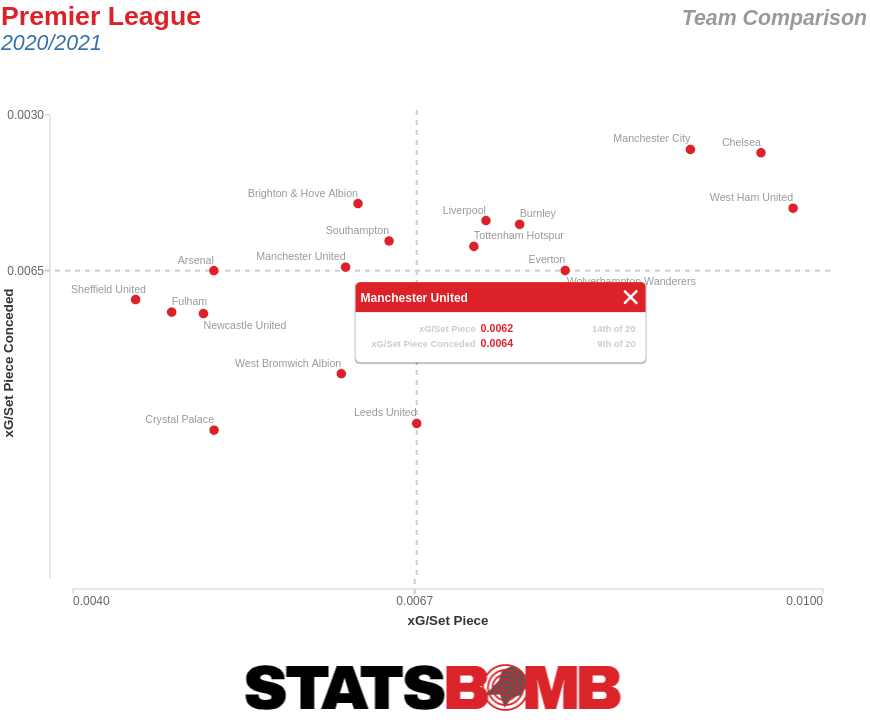 The fact that Leverkusen's attack was slightly better than their defense made sense given the high level of attacking talent in the fold, but in the grand scheme of things, that didn't matter because the end result was a mediocre side and that's not good enough for a club that's been a relative mainstay in the Champions League over the past seven seasons. The switch to Bosz mid-season saw Leverkusen's performance shoot up substantially. They controlled just over 57% of shot attempts, a solid share of shots and something you would come to expect from a CL level side. Expected goals tells an even stronger story, with Leverkusen having an expected goal difference per game of 0.99 that only Bayern Munich bested during the second half of the season.
The fact that Leverkusen's attack was slightly better than their defense made sense given the high level of attacking talent in the fold, but in the grand scheme of things, that didn't matter because the end result was a mediocre side and that's not good enough for a club that's been a relative mainstay in the Champions League over the past seven seasons. The switch to Bosz mid-season saw Leverkusen's performance shoot up substantially. They controlled just over 57% of shot attempts, a solid share of shots and something you would come to expect from a CL level side. Expected goals tells an even stronger story, with Leverkusen having an expected goal difference per game of 0.99 that only Bayern Munich bested during the second half of the season. 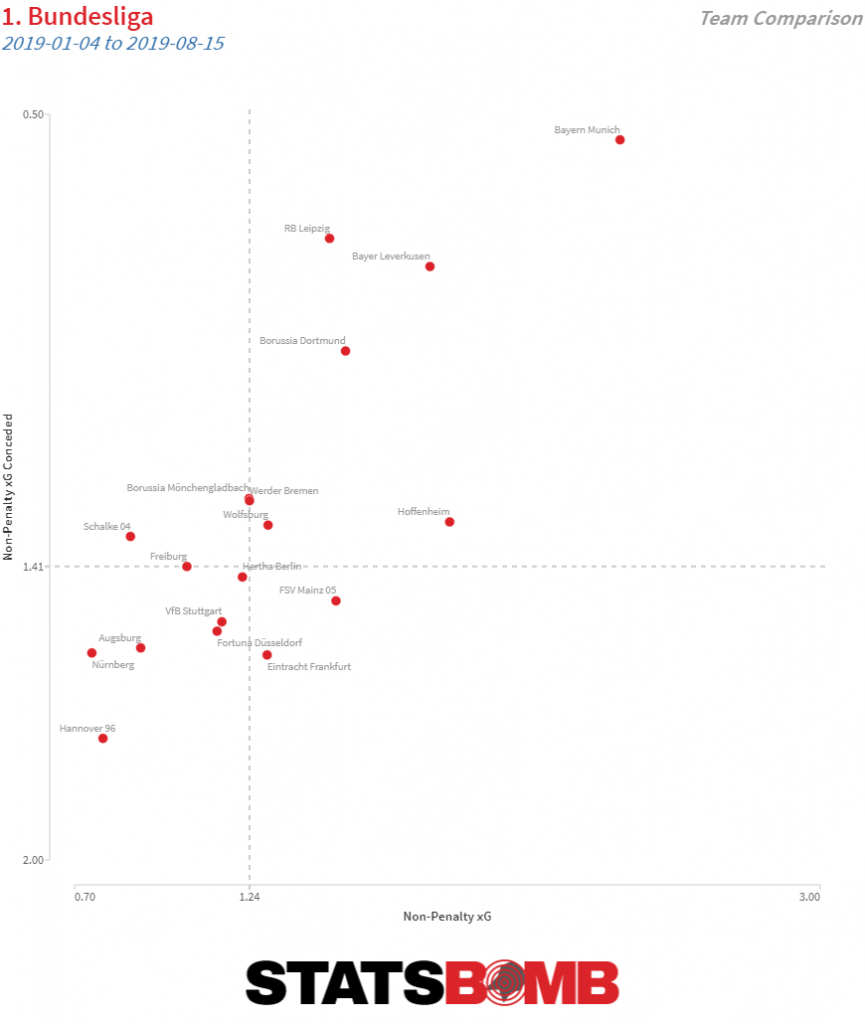 Another major difference between Herrlich and Bosz was the level of aggressiveness in winning the ball back. During the first half of the season, Leverkusen under Herrlich were one of the more passive teams in the Bundesliga both in how high up they won the ball and unremarkable in how many passes they allowed the opponent to have before committing a defensive action. While it wasn't surprising to see that change under Bosz given how Ajax and Dortmund played under his watch, it still remains striking to see how much more aggressive Leverkusen became in hunting the ball back and not giving the opposition time to build from the back.
Another major difference between Herrlich and Bosz was the level of aggressiveness in winning the ball back. During the first half of the season, Leverkusen under Herrlich were one of the more passive teams in the Bundesliga both in how high up they won the ball and unremarkable in how many passes they allowed the opponent to have before committing a defensive action. While it wasn't surprising to see that change under Bosz given how Ajax and Dortmund played under his watch, it still remains striking to see how much more aggressive Leverkusen became in hunting the ball back and not giving the opposition time to build from the back. 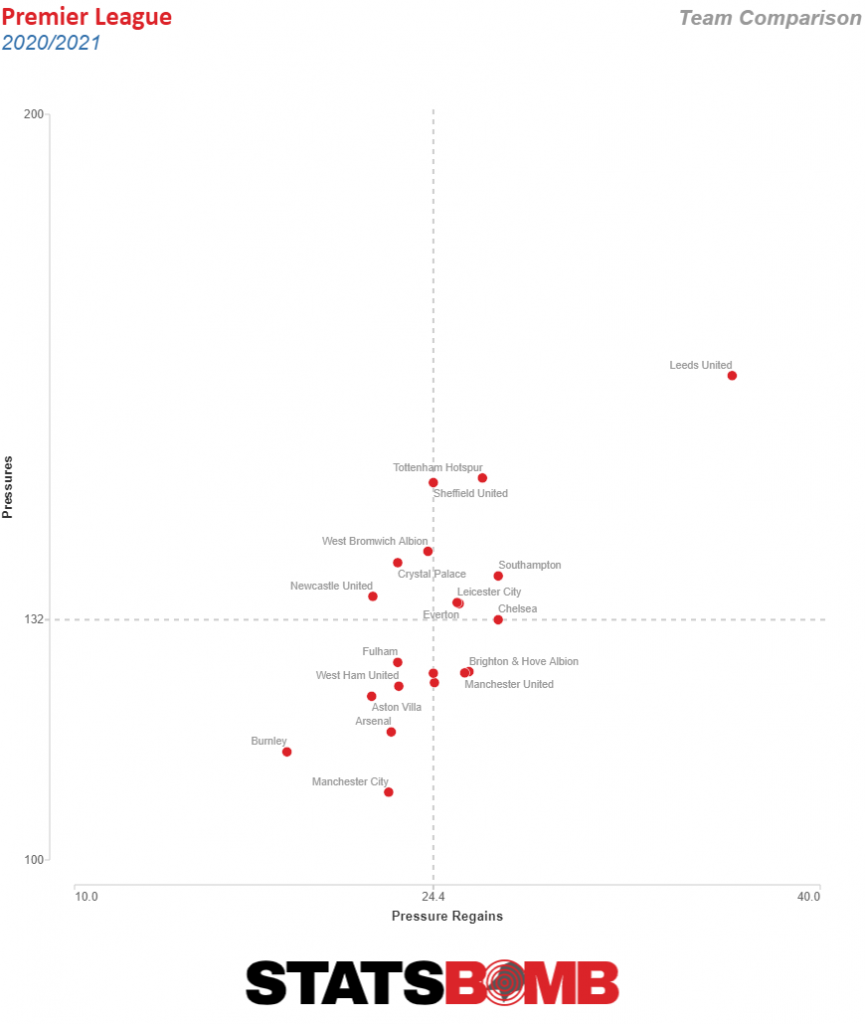
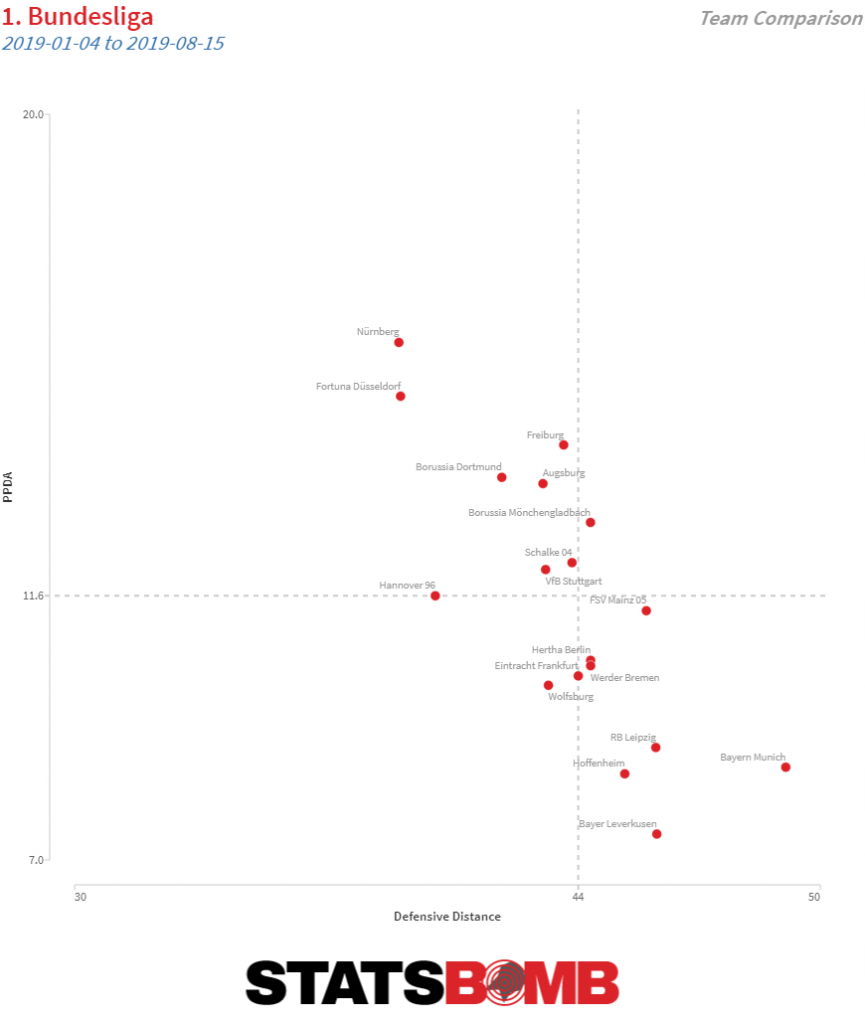 Put it all together, and what you have here is the type of uptick in performance in-season that is quite rare to see. It's not out of the ordinary to see a team start slow through the first half of the season and have better metrics as the season goes along, but it’s something entirely different to jump from having the true talent level of a mid-table outfit to becoming a top two or three side. Of course seeing that it's the Bundesliga, you're still dealing with the juggernaut known as Bayern Munich who were ridiculously dominant even during a down year, but it shouldn't go unnoticed just how impressive Bayer Leverkusen were in 2019.
Put it all together, and what you have here is the type of uptick in performance in-season that is quite rare to see. It's not out of the ordinary to see a team start slow through the first half of the season and have better metrics as the season goes along, but it’s something entirely different to jump from having the true talent level of a mid-table outfit to becoming a top two or three side. Of course seeing that it's the Bundesliga, you're still dealing with the juggernaut known as Bayern Munich who were ridiculously dominant even during a down year, but it shouldn't go unnoticed just how impressive Bayer Leverkusen were in 2019.
The Bosz Effect
Given how hard it can be for managers to implement a coherent play style mid-season, especially when trying to play more proactive than reactive football, it was impressive just how much Leverkusen were able to adapt to his methods and reach some of the peaks they did. For sure, they had their stumbles in the second half of the season, but the process was by and large a major success. Given how Leverkusen build out of the back, there was a clear plan for how they were going to progress play. Often times, Wendell would tuck in from the left as a third center back with the double pivot not too far ahead of them. While this was going on, there would be an emphasis on maintaining proper spacing in terms of width and not having too many players situated in one area. When the advanced central midfielders would drop back, it would help create overloads that would allow for one touch combinations, a staple of Leverkusen's attack.
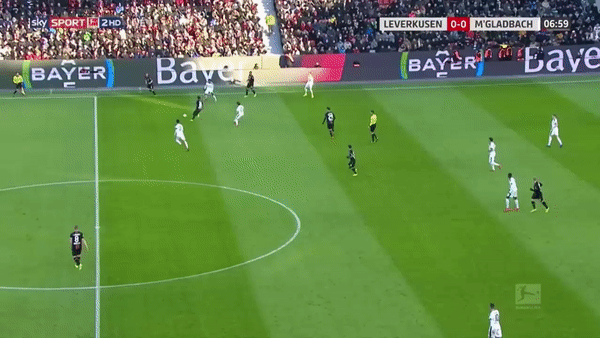
For how much Leverkusen dominated possession, they were extremely good at being able to either create counter attacking shots, and win the ball back high up the pitch, turning those moments into dangerous attacks. Under Bosz, Leverkusen ranked 2nd in counter attacking shots and 1st in shots from possessions that were won within 5 seconds of a defensive action in the opposition half. They were also strong in winning second balls and immediately transitioning the ball forward. Given the amount of compactness in how they were situated to regain possession, along with the cumulative passing talent on the squad, it made sense that they would be one of the better teams at turning defense into attack.
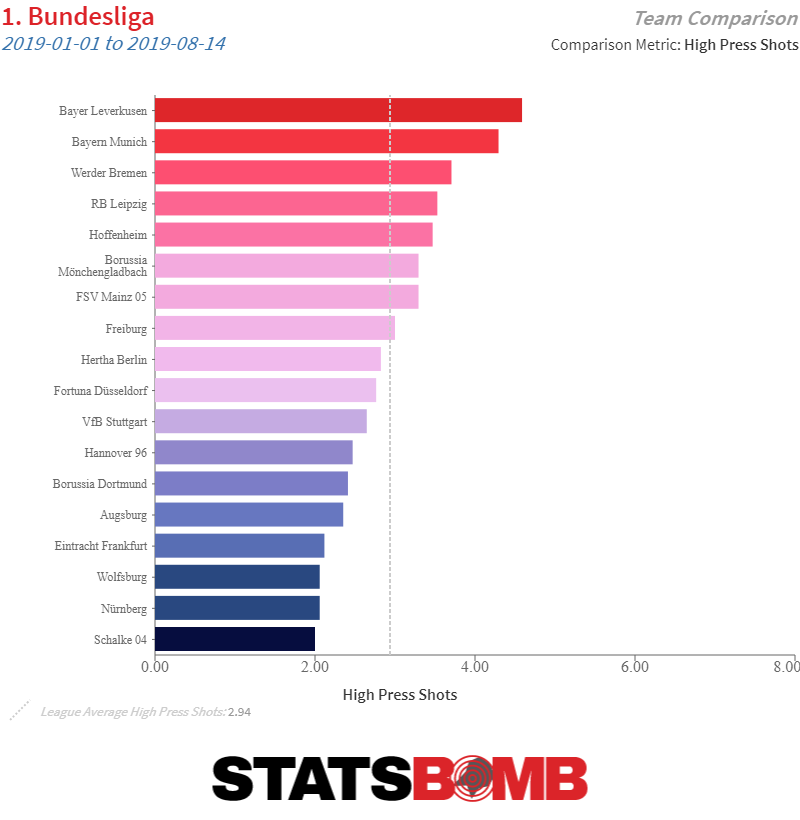
Perhaps the biggest things that Bosz did was turn Julian Brandt and Kai Havertz into players who spent a lot of their minutes operating as free roaming number 8’s (Havertz did eventually migrate into more of a right sided attacker towards the end of the season). They were given license to drop back to help with buildup, make runs deep into the opposition area + penalty box, and dictate play when needed through quick combinations. They developed a good sense for knowing when one would roam high up the pitch with the other dropping back to cover. Brandt’s ability to carry the ball in central areas had greater impact than when he was operating in the wide areas, seeing as his passing options out wide were considerably more restricted. Playing as an 8, he was able to utilize his ball carrying abilities as part of Leverkusen’s transition from patient buildup into controlled chaos. As good as his exploits on the ball were, Brandt could also be just as delightful working without it. His interpretation of space and knowing where to be to maintain proper spacing, and not eliminating passing options for others was strong. While Brandt was an intriguing player during his days as a full time winger, he arguably hit a new level of performance during the second half of 2018–19.
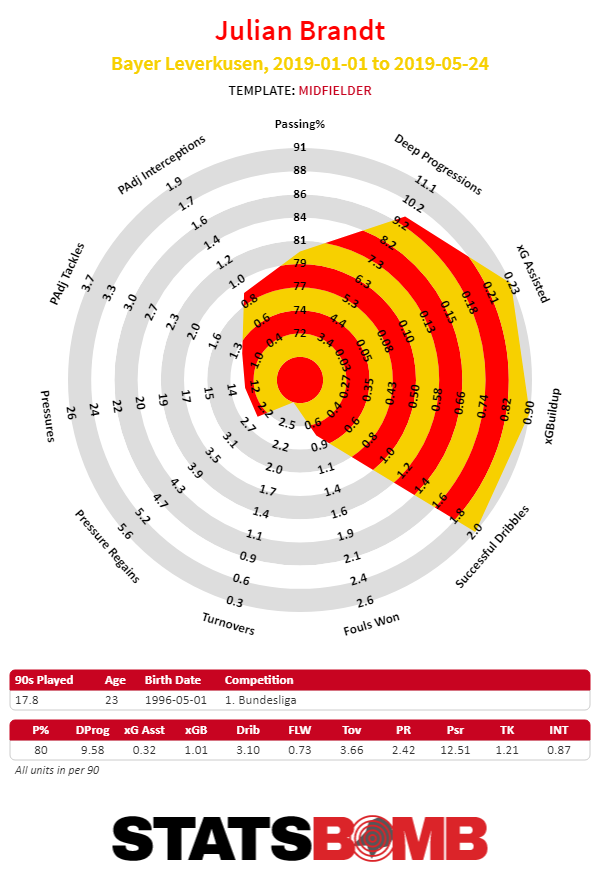 Bosz's appointment also did wonders for Leon Bailey, who was much better in 2019 vs 2018. I've long been a big fan of Bailey, particularly because he's the rare young winger who combines functional athleticism at an elite level with strong on-ball skills. Among Bayer Leverkusen players who played at least 900 league minutes, Bailey ranked 4th in open play xG assisted, 3rd in open play chances created, and 4th in open play passes into the box. In addition, he's also a credible crosser as he ranked 2nd on Leverkusen in completed crosses with 1.96 per 90 minutes at a 40% completion rate. The bar to being a valuable player for a winger playing on his natural side is probably higher versus functioning as an inverted winger, but Bailey has the all-around skillset needed to succeed at a star level.
Bosz's appointment also did wonders for Leon Bailey, who was much better in 2019 vs 2018. I've long been a big fan of Bailey, particularly because he's the rare young winger who combines functional athleticism at an elite level with strong on-ball skills. Among Bayer Leverkusen players who played at least 900 league minutes, Bailey ranked 4th in open play xG assisted, 3rd in open play chances created, and 4th in open play passes into the box. In addition, he's also a credible crosser as he ranked 2nd on Leverkusen in completed crosses with 1.96 per 90 minutes at a 40% completion rate. The bar to being a valuable player for a winger playing on his natural side is probably higher versus functioning as an inverted winger, but Bailey has the all-around skillset needed to succeed at a star level. 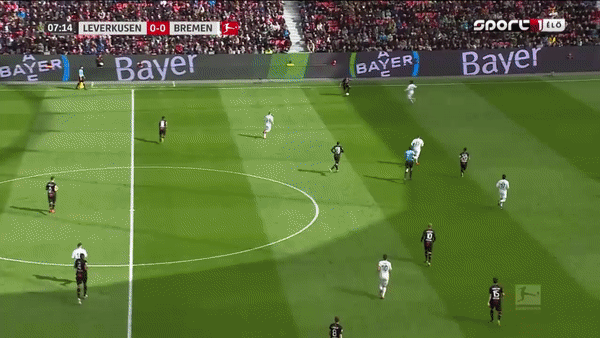
Transfers
Bayer Leverkusen’s business to this point has been rather efficient, as it tends to be for Bundesliga clubs. The departure of Julian Brandt was significant given the value he provided last season, along with him amazingly still being only 23 years old despite having logged regular minutes since the 2014–15 season, so there might’ve been the chance of him still getting better with another season under Bosz. It also didn’t help that he was snatched up by Borussia Dortmund, a club that Leverkusen will be competing with for Champions League positioning for this upcoming season.
It’s hard to pick holes with what Leverkusen did. In having to make up for the departed Brandt, they were part of the pillaging of Hoffenheim and got both Kerem Demirbay and Nadiem Amiri, talented midfielders in their own right for just under £40m combined. Given Daley Sinkgraven's injury history, they didn't have to pay much to get him from Ajax and he should function as squad depth. What will dictate a fair amount of their season is just how much Demirbay can replace what Brandt brought to the table, and if he could replicate what he did for Hoffenheim last season, then there's the chance that Leverkusen come close to not missing a beat.
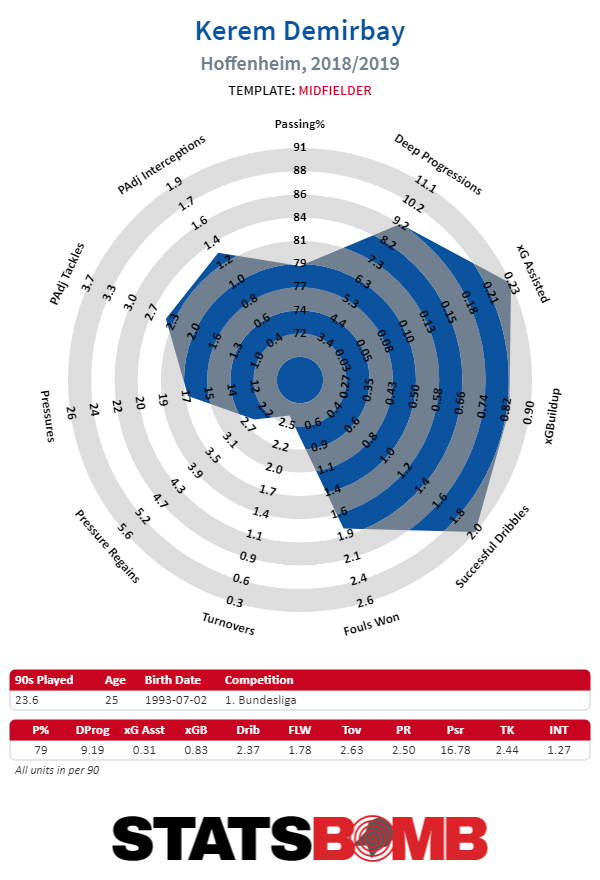
Another intriguing get by Leverkusen was snatching up Moussa Diaby from PSG. Diaby is an interesting prospect: he was a notable player at youth levels in France with him winning the Titi d’Or in 2016 for most promising male talent in the PSG academy, but was at risk of being another example of PSG’s inability to utilize their impressive academy. Then last season happened, where Diaby was one of several academy kids to get some game time in Ligue 1. For a 19 year old in his first season in a big 5 league, putting up a scoring contribution (goals + assists) per 90 rate of 0.57 with expected goals + assists numbers that weren’t too far behind was pretty impressive.
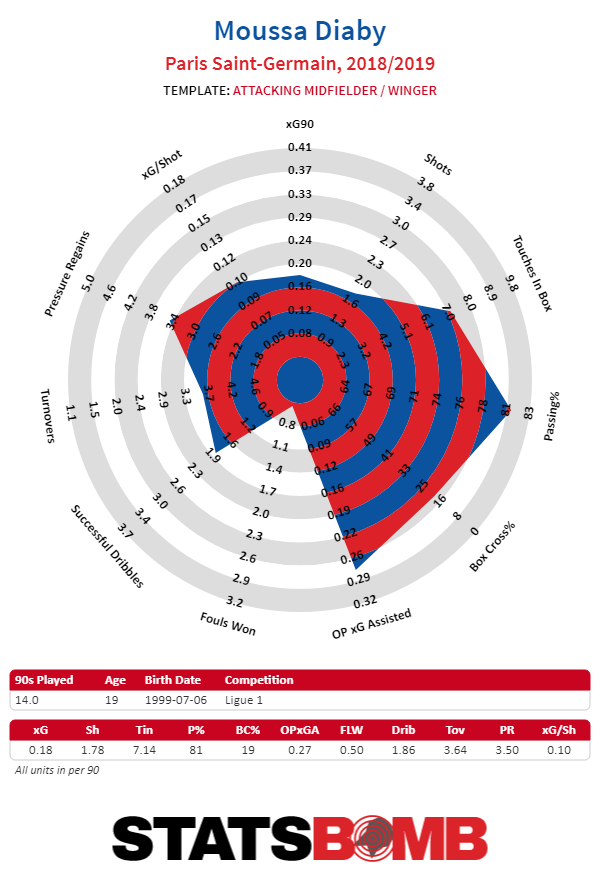
Despite the strong work in 1260 league minutes last season, I do have some reservations about Diaby’s ceiling as a prospect. Playing on a super team that has a ridiculous talent advantage over the rest of the league will help in inflating your statistical production. With PSG, Diaby functioned a lot of times as an off-ball runner on the left side who was tasked with keeping the pitch stretched and taking advantage of space behind the backline to run in and create cut-backs in the box. Diaby's off-ball work was excellent for someone his age, and that should be celebrated. His on-ball work has more questions: he's extremely left-footed, his touch and ability to cleanly receive the ball in the inside channels was erratic, and he was prone to not having great awareness and missing out on runners making runs into dangerous areas, merely recycling the ball to a nearby teammate. It's also hard to know how much Diaby will get to do what made him successful last season, which is stretch the opposition and make runs into the wide areas of the penalty box.
2019-20 Outlook
It would be fun to say that this Bayer Leverkusen side comes into 2019-20 as a dark horse given their collective squad talent and how strong they were in 2019, but it's just hard to go there so long as Bayern Munich exists. Even with things not going their way for large portions of the season, they still won the Bundesliga title and were statistically by far the best team in the league. Though the current iteration of Bayern would not compare favorably to some of the previous ones from the 2010s, they still possess the most talented squad in the league and should once again finish at the top so long as a total meltdown doesn't occur. With all that out of the way, there's a lot to be excited for with the upcoming 2019-20 season for Bayer Leverkusen. We get a full season of Peter Bosz at the helm, and see if the club can pick things right up from where they were last season in terms of performance. Their summer signings were smart and should help in a meaningful way. With Bailey and Havertz, there's the potential that this is the year that either or both make the leap into true stardom. If one does it, then qualifying for the Champions League should be well within their reach. If both become stars in the same season, then the idea of Leverkusen running Bayern relatively close as the 2nd best team in Germany becomes more feasible. Set some free time during the season to watching Bayer Leverkusen. For good or for bad, they're always a fascinating side, and 2019-20 could feature a lot more good than bad.
